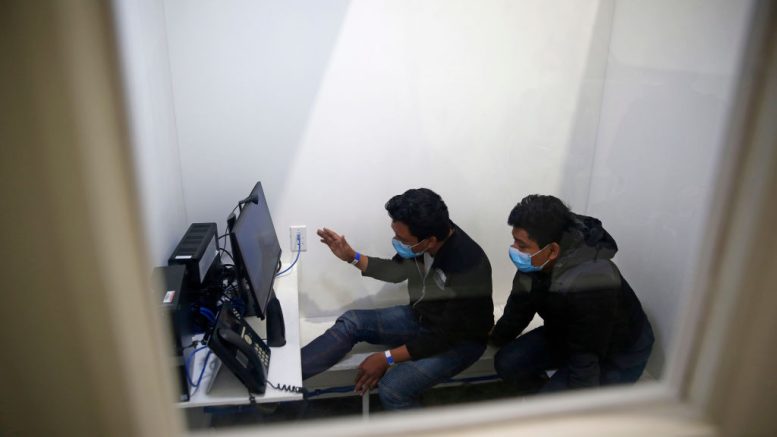Expensive per-minute fees make calls unaffordable for many migrant detainees, who can earn as little as $1 a day working in ICE facilities.
By Kate Morrissey, Capital & Main
This story is produced by the award-winning journalism nonprofit Capital & Main and co-published here with permission.
After a man from Pakistan crossed the U.S.-Mexico border to request asylum in February, immigration officials sent him to a detention center in New Mexico where he was the only Urdu speaker.
He found solace in a program created during the pandemic that allowed people in immigration custody to make a small number of free phone calls each month. The program allowed them to avoid the expensive per-minute charges that detainees typically must pay. He spoke with his family, particularly his mother, for a few minutes every day, he said.
But Immigration and Customs Enforcement abruptly ended the free phone call program in early June, and the man said he hadn’t spoken to his mother in weeks.
“Mostly, I’ve been silent and lonely,” he said through an Urdu interpreter.
The man asked not to be identified out of concern for the well-being of family members, who no longer live in Pakistan.
He and many other detainees are facing increased mental health struggles now that they’re unable to call loved ones on a regular basis, according to attorneys and other advocates. The loss of the program has also hindered many detainees’ ability to communicate with their attorneys or get help from advocates.
Though each facility has a process for attorneys to request phone time with their clients, it can be slow and difficult to get scheduled. Sophia Genovese, who represents the man from Pakistan, said the facility where he is now being held requires at least 24 hours’ notice. And while the hotline for the New Mexico Immigrant Law Center, the nonprofit where she works, is supposed to be free for people in local ICE custody to call, her own cellphone is not. If her client needs to reach her urgently, he can’t do that without paying for a call.
The lack of free phone calls also makes it more difficult for her clients to reach family members to gather evidence they may need for their immigration cases, she said.
ICE did not respond to Capital & Main’s requests for comment about the program’s end.
ICE began the free calls program in 2020 as facilities shut down in-person visitation due to the spread of COVID-19. The implementation of the program appears to have varied from facility to facility. But across the country, detainees have used the program to communicate with family members and attorneys. They’ve even used the program to reach journalists to call attention to conditions inside the facilities.
Jennifer Ibañez Whitlock, supervisory policy and practice counsel at the American Immigration Lawyers Association, said the choice to end the program appears to be part of a broader move by ICE to cut costs.
“This is an agency that frequently relies on asking for additional funding beyond what it’s given in appropriations,” Whitlock said. “It uses budget models but doesn’t review them.”
She pointed to a government oversight report that strongly criticized ICE’s budgeting practices.
People held in ICE facilities are in civil rather than criminal custody, meaning there are differences in treatment standards. Among them, people in immigration custody are not supposed to be forced to work. However, advocates argue that the high prices charged by phone contractors used by the facilities obligate detainees to work in the facilities, which often pay as little as $1 per day.
“It takes you a lot of time to save up money for a call,” Whitlock said.
More than two-thirds of the people in ICE custody so far in fiscal 2024 were apprehended by Customs and Border Protection rather than ICE, according to ICE data. That means that they were likely taken into custody after crossing the border to request asylum. Many have little financial support or access to funds while in custody.
Many attorneys and advocates who support detainees through letter-writing and hotlines have spoken out against the decision to take away their free phone access.
On Thursday, Detention Watch Network sent a letter signed by 221 organizations to Homeland Security Secretary Alejandro Mayorkas urging him to reinstate the program.
“Depriving detained people of this service with little advance notice and without meaningful engagement with organizations directly representing those in detention underscores a disregard for the basic humanity of those navigating their immigration cases while held in detention and further isolates and punishes them,” the document states.
The letter asserts that ICE has, in the past, cited the free calls program in court to justify its detention practices. In response to a court case filed in 2022 in Washington, D.C., that alleges ICE interfered with attorneys’ ability to communicate with detained clients, the agency argued that the free phone calls program is one of the ways that detainees have access to their lawyers.
The letter also condemns the increased use of immigration detention by the Biden administration — including requests for more detention space around the country — amid what it calls “deteriorating conditions” at the facilities as the number of people being held goes up. It points out that 11 people have died in ICE custody so far this fiscal year. The prior year, four people died in custody, according to ICE records.
Amilcar Valencia, executive director of El Refugio, a nonprofit that supports people held in custody at the Stewart Detention Center in rural Lumpkin, Georgia, said that he noticed a large dropoff in calls to his organization’s hotline after the free phone calls program ended.
Then he heard from a concerned mother in Colombia whose son had suddenly stopped calling from the detention center, and Valencia had to explain to her that the free calls had been eliminated. It’s difficult for families like hers to scrape together money to deposit in their loved ones’ commissary accounts, let alone figure out how to do that from abroad, Valencia said.
“The phone calls are the only way that they keep in touch,” he said. “You are a parent or a husband or a son, and you continue to be that in detention. This is the only way you have, and it’s taken away. It basically turns everything upside down.”
His organization is raising money to add funds to detainees’ commissary accounts so that they can continue to make periodic calls.
The end of the free phone calls program has also intensified the legal fight over whether people in ICE custody can be paid as little as $1 per day for working inside the facilities, less than what prison inmates in California make. Attorneys have filed lawsuits across the country over the past decade claiming that the pay practices violate minimum wage and forced labor laws. If detainees are deprived of basic needs, such as the ability to communicate with attorneys or loved ones, unless they join the work programs, many of the lawsuits argue, then the work programs should no longer be considered voluntary.
Meanwhile, some detainees are staging protests over the end of the free phone calls program.
In Batavia, New York, about 40 people in ICE custody at the Buffalo Federal Detention Facility went on a hunger strike to protest the change, according to Justice for Migrant Families, an organization that offers support to immigrants in custody in the region.
Officials threatened the strikers with being locked in their cells 24 hours a day or with solitary confinement, according to Justice for Migrant Families, which said it received sworn statements from several strikers. Some detainees were strapped down and taken to solitary, the organization said in a press release. One detainee told Justice for Migrant Families that, in the process of taking him to solitary confinement, the guards became violent, beat him and wrapped him tightly in a sheet, even as he shouted that he could not breathe.
In California, people held in ICE custody in Bakersfield and nearby McFarland began a labor strike inside the detention centers at the beginning of July to push ICE to make several changes, including restoring the program. Strikers are also calling for an end to solitary confinement, adequate food and medical care, fair review of their immigration cases and an end to the contracts for the two facilities where they are held.
For the man from Pakistan, the sudden loss of his mother’s voice has pushed him further into depression. His hair is starting to turn white, he said, though he’s only 28. He said his short-term memory fails him frequently, and that scares him, too.
He worries about what will happen if and when he is deported to Pakistan, where he fears for his life. But he can’t stop thinking about it because he has no one to talk with to at least distract him from such thoughts. There are no books in Urdu for him to read, nothing to take his mind off the situation.
“I am going through mental torture here,” he said. “I want to get free. I want justice.”
Copyright 2024 Capital & Main






Be the first to comment on "Detained immigrants lose a lifeline as ICE ends free phone time program"